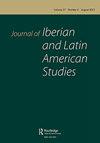Motherhood, labor, and anti-fascism: the construction of refugee identity by Spanish women exiled in France, 1939–1976
IF 0.3
0 HUMANITIES, MULTIDISCIPLINARY
Journal of Iberian and Latin American Studies
Pub Date : 2021-01-02
DOI:10.1080/14701847.2021.1897755
引用次数: 0
Abstract
ABSTRACT This article aims to analyze how Spanish refugee identity emerged in France, the basis on which it was built, and the way the gender gap exerted an influence in its creation. For this purpose, we have examined the correspondence sent by women to three relief bodies offering assistance in exile (the Aid Commission for Spanish Refugee Children in France, the Evacuation Service of Spanish Refugees, and Spanish Democratic Solidarity) and attempted to demonstrate that, despite being an identity imposed in part by vicissitudes, institutions and organizations that assisted refugees, it was also an identity that was built, appropriated and reshaped by women for their own benefit. We argue that gender was a constitutive element of this new identity and that, in light of the analyzed material, it was developed on the basis of at least three factors: motherhood, labor and anti-fascism.母性、劳动与反法西斯:1939-1976年流亡法国的西班牙妇女对难民身份的建构
本文旨在分析西班牙难民身份认同在法国的形成及其基础,以及性别差异对其形成的影响。为此目的,我们审查了妇女写给提供流亡援助的三个救济机构的信件(援助法国西班牙难民儿童委员会、西班牙难民撤离服务和西班牙民主团结),并试图证明,尽管这是一种部分由援助难民的沧桑、机构和组织强加的身份,但它也是一种建立起来的身份。被女性为了自己的利益挪用和改造。我们认为,性别是这种新身份的一个构成要素,根据分析的材料,它是在至少三个因素的基础上发展起来的:母性、劳动和反法西斯主义。
本文章由计算机程序翻译,如有差异,请以英文原文为准。
求助全文
约1分钟内获得全文
求助全文
来源期刊

Journal of Iberian and Latin American Studies
HUMANITIES, MULTIDISCIPLINARY-
CiteScore
0.40
自引率
33.30%
发文量
23
 求助内容:
求助内容: 应助结果提醒方式:
应助结果提醒方式:


